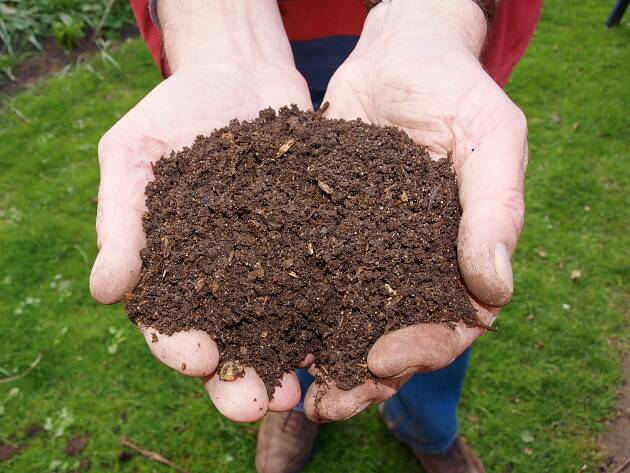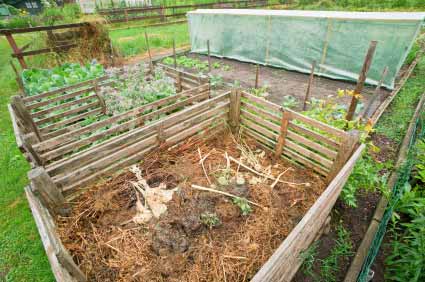
Even minor oversights cause compost not to decompose. Too few compost worms or indiscriminate piling are among the most common pitfalls that torpedo the decomposition of garden and kitchen waste into valuable natural fertilizer. Even when home gardeners compost strictly according to directions, the rotting process takes a whopping twelve months. Read this guide to successfully speed up composting.
Optimize compost worm population
For compost to rot quickly, it’s important to have a sufficient number of industrious compost worms. In addition to countless microorganisms and tiny creatures, special subspecies of the earthworm process your garden and kitchen waste into humus soil. As the name indicates, a compost worm prefers to choose a compost or dung heap as its habitat. Here it feeds on plant residues and organic kitchen waste, which is excreted as humus. It sometimes takes some time for a sufficient population to settle in the compost heap. Along the way, the compost rots very slowly or not at all. By purchasing compost worms from a specialty store and releasing them, you will speed up composting significantly. Here’s how to do it correctly:
Ideally, purchase live compost worms at a regional specialty store.
Alternatively, order online from special worm farms
1000 worms are sufficient per m³ (450 l) of compost.
Spread on the compost heap on the same day
Reputable online suppliers ship live compost worms from Monday to Thursday. For safe transport, the shipment of each 1000 earthworms should include about 1 kilogram of worm humus. Please give preference to those suppliers who, in the summertime, use reusable
Contents
Chop and mix ingredients

For compost worms, microorganisms and microorganisms to work smoothly, the right composition of ingredients is essential. A wide range of vegetable garden and kitchen waste is suitable for conversion into natural fertilizer. These include withered plant parts, prunings from woody plants, lawn clippings, leftover vegetables and fruit. However, the organic material causes the industrious helpers considerable digestive problems if it is too coarse, too fine, too wet or too dry. In the worst case, the entire processing procedure comes to a standstill and the compost does not rot. Here’s how to put some pep in your composting:
- Shred woody waste in advance in a shredder to 5 to 10 cm.
- Chop thick peels of oranges, lemons, bananas before composting.
- Tear tea bags and coffee filters
- Mix coarse with fine and wet with dry material
Examples: Wood chippings with lawn clippings or wilted perennials with fall leaves.
Alternatively, spread different consistencies as thin layers alternately
The more diverse the composition of the starting material, the faster the processing by compost worms & Co. will proceed. Conversely, compost cannot rot if it consists of a large pile of lawn clippings or scarifying residues. A
compost pile does not rot, but stinks to high heaven when cooked food scraps, meat and bones accumulate. Combined with rising temperatures, rot spreads, inevitably attracting rats and mice. In this case, even mixing with chopped wood chips will not set the rot to work.
Note: Did you know that summer heat stops rotting in compost? Even in a shady location, the decomposition process comes to a halt when the material dries out. Water the compost pile with rainwater or stagnant tap water in midsummer, when the sky keeps its floodgates closed.
Add compost accelerator
The lengthy process of turning organic waste piles into nutritious permanent humus grates on the nerves. Under optimal conditions, busy microorganisms can claim up to twelve months for their beneficial activity. Who does not like to be patient over such a long period, resorts to a compost accelerator. These are natural aids in the form of bacteria and fungal cultures that speed up the decomposition process.

Ready-to-use compost accelerators are available in powder form. Sprinkle the agent thinly on the unwilling compost pile directly from the package. Spread about 30 grams per square meter on each 10- to 20-centimeter-high layer, as well as a 3-to-5-centimeter layer of garden soil. Repeated mixing or turning optimizes effectiveness. The bacteria and fungi contained in it get to work immediately, so that the heat fermentation starts within a few days. Ideally, you should cover the compost pile with reed mats during this time.
Make your own rotting aids
Here’s how to do it (materials needed for 1 m³ of compost):
- 500 grams of sugar
- 8 l water (lukewarm)
- 1 cube fresh yeast
- 1 bucket
- 1 watering can
To prepare the mixture, pour the lukewarm water into the bucket and add the yeast cube
Add the yeast cube, which you have previously crushed with your fingers. Stir the water and yeast pieces vigorously so that oxygen accumulates in it. Now add the sugar, stirring constantly until it is completely dissolved. Let the mixture sit for about 60 minutes, stirring occasionally. Pour the finished compost accelerator into the watering can and spread it evenly over the compost pile. Finally, mix the compost thoroughly. Over the next three days, the temperature will rise significantly. If available, you can use a compost thermometer to monitor the process. After a week of waiting, turn the compost or mix the material well one more time.
Mode of action
Thanks to the home-made rotting aid, the decomposition process in the compost is activated. This is primarily accomplished with a combination of 80 percent moisture, at least 15 degrees of heat and plenty of air. Under these conditions, bacteria and fungi multiply rapidly, provided that nitrogen and carbon are available in the ideal ratio of 1:20. By adding compost accelerator, you establish the perfect balance. Dissolved sugar acts as an energy supplier for the required hot rot. The yeast cube contains important fungi for the decomposition process. The more planned and loose you have created the compost pile, the more effectively the aid accelerates sluggish composting.
Plant compost accelerators

Nature-loving home gardeners start each new gardening season with an ample supply of plant jellies. Nettles, comfrey and valerian not only make themselves useful for ecological plant protection. After the fermentation process, the rich yews act as natural compost accelerators at zero cost. Here’s how to produce a plant-based rotting helper the right way:
- Set up a rain barrel or old tub in a remote corner of the garden.
- Collect 1,000 grams of non-flowering nettle, comfrey or valerian leaves.
- Put leaves in the container and fill with 10 liters of rainwater
- Cover the barrel or tub with rabbit wire
- Stir daily with a wooden stick
After about three weeks, the fermentation process is complete. Filter the slurry with a sieve or remove the fermented leaves with an old dipper. Dilute the plant slurry with fresh, low-lime water at a ratio of 1:10. Use a watering can to apply the plant compost accelerator and mix the pile thoroughly with a digging fork.

